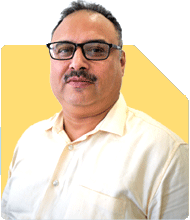Ramalingam Kalirajan |8192 Answers |Ask -Follow
Mutual Funds, Financial Planning Expert - Answered on May 08, 2024
He has an MBA in finance from the University of Madras and is a certified financial planner.
He is the director and chief financial planner at Holistic Investment, a Chennai-based firm that offers financial planning and wealth management advice.... more

Is it good to invest in a shop in food court located inside a commercial building with office space in noida as a investment.also the builder is assuring fix rental incomw
Lack of Regulation: The rental assurance provided by the builder may not be regulated by any governing authority. Thus, there's a risk that the builder might default on their promise.
Lack of Liquidity: Unlike stocks or mutual funds, real estate investments, especially in commercial properties, lack liquidity. It might be challenging to sell your shop quickly if needed.
Assurance Not Guaranteed: While the builder may assure fixed rental income, there's no guarantee that this assurance will hold in the long term. Economic downturns or changes in market conditions could affect rental yields.
However, if you're comfortable with these risks and believe in the potential of the location and the project, investing in a shop in a food court could offer long-term returns. Ensure thorough due diligence, including understanding the terms of the rental agreement, assessing the demand for commercial space in the area, and considering potential future developments that could impact the property's value.
It's always advisable to consult with a Certified Financial Planner or real estate expert before making any significant investment decisions. They can provide personalized advice tailored to your financial goals and risk tolerance. Remember, diversification is key to a well-rounded investment portfolio. Good luck!
You may like to see similar questions and answers below
Baqar Iftikhar Naqvi |113 Answers |Ask -Follow
Start-up Mentor - Answered on May 27, 2024
Ramalingam Kalirajan |8192 Answers |Ask -Follow
Mutual Funds, Financial Planning Expert - Answered on Jul 17, 2024
Dr Nagarajan Jsk |314 Answers |Ask -Follow
NEET, Medical, Pharmacy Careers - Answered on Apr 06, 2025
Dr Nagarajan Jsk |314 Answers |Ask -Follow
NEET, Medical, Pharmacy Careers - Answered on Apr 06, 2025
Dr Nagarajan Jsk |314 Answers |Ask -Follow
NEET, Medical, Pharmacy Careers - Answered on Apr 06, 2025
Dr Nagarajan Jsk |314 Answers |Ask -Follow
NEET, Medical, Pharmacy Careers - Answered on Apr 06, 2025
Dr Nagarajan Jsk |314 Answers |Ask -Follow
NEET, Medical, Pharmacy Careers - Answered on Apr 06, 2025
Radheshyam Zanwar |1519 Answers |Ask -Follow
MHT-CET, IIT-JEE, NEET-UG Expert - Answered on Apr 06, 2025
Dr Nagarajan Jsk |314 Answers |Ask -Follow
NEET, Medical, Pharmacy Careers - Answered on Apr 06, 2025
Dr Nagarajan Jsk |314 Answers |Ask -Follow
NEET, Medical, Pharmacy Careers - Answered on Apr 06, 2025
Dr Dipankar Dutta |1093 Answers |Ask -Follow
Tech Careers and Skill Development Expert - Answered on Apr 05, 2025
Prof Suvasish Mukhopadhyay |552 Answers |Ask -Follow
Career Counsellor - Answered on Apr 05, 2025





















